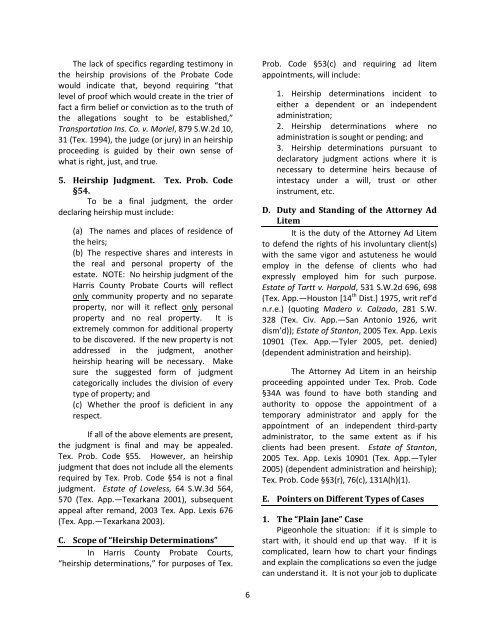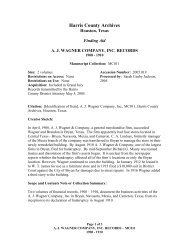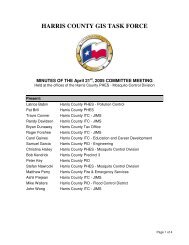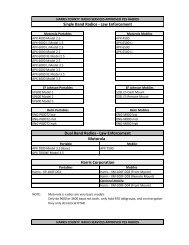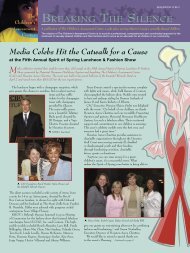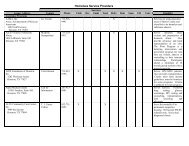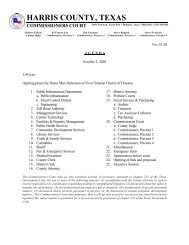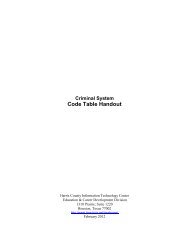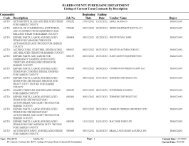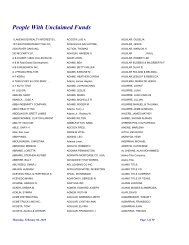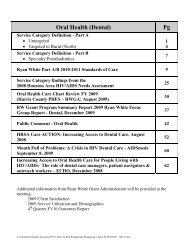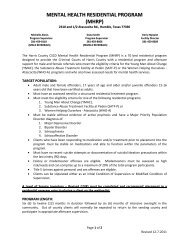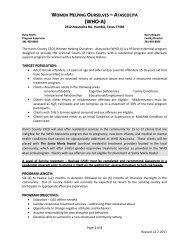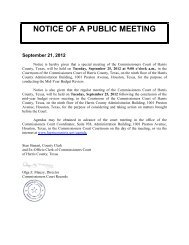Harris County Probate Courts The Ad Litem Manual for Heirship ...
Harris County Probate Courts The Ad Litem Manual for Heirship ...
Harris County Probate Courts The Ad Litem Manual for Heirship ...
Create successful ePaper yourself
Turn your PDF publications into a flip-book with our unique Google optimized e-Paper software.
<strong>The</strong> lack of specifics regarding testimony in<br />
the heirship provisions of the <strong>Probate</strong> Code<br />
would indicate that, beyond requiring “that<br />
level of proof which would create in the trier of<br />
fact a firm belief or conviction as to the truth of<br />
the allegations sought to be established,”<br />
Transportation Ins. Co. v. Moriel, 879 S.W.2d 10,<br />
31 (Tex. 1994), the judge (or jury) in an heirship<br />
proceeding is guided by their own sense of<br />
what is right, just, and true.<br />
5. <strong>Heirship</strong> Judgment. Tex. Prob. Code<br />
§54.<br />
To be a final judgment, the order<br />
declaring heirship must include:<br />
(a) <strong>The</strong> names and places of residence of<br />
the heirs;<br />
(b) <strong>The</strong> respective shares and interests in<br />
the real and personal property of the<br />
estate. NOTE: No heirship judgment of the<br />
<strong>Harris</strong> <strong>County</strong> <strong>Probate</strong> <strong>Courts</strong> will reflect<br />
only community property and no separate<br />
property, nor will it reflect only personal<br />
property and no real property. It is<br />
extremely common <strong>for</strong> additional property<br />
to be discovered. If the new property is not<br />
addressed in the judgment, another<br />
heirship hearing will be necessary. Make<br />
sure the suggested <strong>for</strong>m of judgment<br />
categorically includes the division of every<br />
type of property; and<br />
(c) Whether the proof is deficient in any<br />
respect.<br />
If all of the above elements are present,<br />
the judgment is final and may be appealed.<br />
Tex. Prob. Code §55. However, an heirship<br />
judgment that does not include all the elements<br />
required by Tex. Prob. Code §54 is not a final<br />
judgment. Estate of Loveless, 64 S.W.3d 564,<br />
570 (Tex. App.—Texarkana 2001), subsequent<br />
appeal after remand, 2003 Tex. App. Lexis 676<br />
(Tex. App.—Texarkana 2003).<br />
C. Scope of “<strong>Heirship</strong> Determinations”<br />
In <strong>Harris</strong> <strong>County</strong> <strong>Probate</strong> <strong>Courts</strong>,<br />
“heirship determinations,” <strong>for</strong> purposes of Tex.<br />
6<br />
Prob. Code §53(c) and requiring ad litem<br />
appointments, will include:<br />
1. <strong>Heirship</strong> determinations incident to<br />
either a dependent or an independent<br />
administration;<br />
2. <strong>Heirship</strong> determinations where no<br />
administration is sought or pending; and<br />
3. <strong>Heirship</strong> determinations pursuant to<br />
declaratory judgment actions where it is<br />
necessary to determine heirs because of<br />
intestacy under a will, trust or other<br />
instrument, etc.<br />
D. Duty and Standing of the Attorney <strong>Ad</strong><br />
<strong>Litem</strong><br />
It is the duty of the Attorney <strong>Ad</strong> <strong>Litem</strong><br />
to defend the rights of his involuntary client(s)<br />
with the same vigor and astuteness he would<br />
employ in the defense of clients who had<br />
expressly employed him <strong>for</strong> such purpose.<br />
Estate of Tartt v. Harpold, 531 S.W.2d 696, 698<br />
(Tex. App.—Houston [14 th Dist.] 1975, writ ref’d<br />
n.r.e.) (quoting Madero v. Calzado, 281 S.W.<br />
328 (Tex. Civ. App.—San Antonio 1926, writ<br />
dism’d)); Estate of Stanton, 2005 Tex. App. Lexis<br />
10901 (Tex. App.—Tyler 2005, pet. denied)<br />
(dependent administration and heirship).<br />
<strong>The</strong> Attorney <strong>Ad</strong> <strong>Litem</strong> in an heirship<br />
proceeding appointed under Tex. Prob. Code<br />
§34A was found to have both standing and<br />
authority to oppose the appointment of a<br />
temporary administrator and apply <strong>for</strong> the<br />
appointment of an independent third-party<br />
administrator, to the same extent as if his<br />
clients had been present. Estate of Stanton,<br />
2005 Tex. App. Lexis 10901 (Tex. App.—Tyler<br />
2005) (dependent administration and heirship);<br />
Tex. Prob. Code §§3(r), 76(c), 131A(h)(1).<br />
E. Pointers on Different Types of Cases<br />
1. <strong>The</strong> “Plain Jane” Case<br />
Pigeonhole the situation: if it is simple to<br />
start with, it should end up that way. If it is<br />
complicated, learn how to chart your findings<br />
and explain the complications so even the judge<br />
can understand it. It is not your job to duplicate


